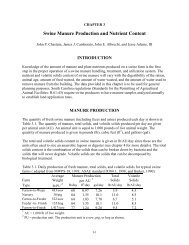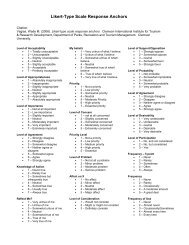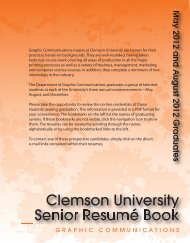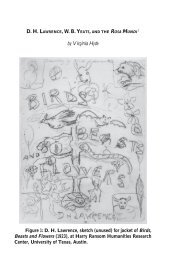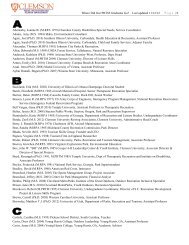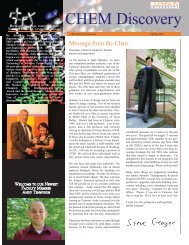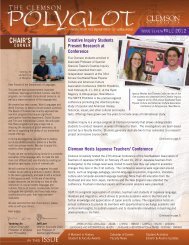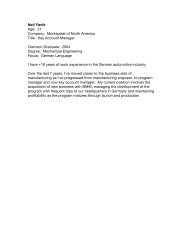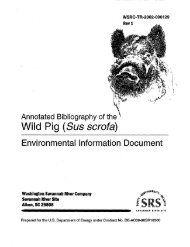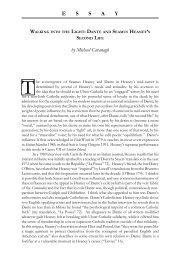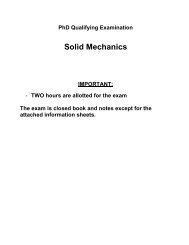Woolfian Boundaries - Clemson University
Woolfian Boundaries - Clemson University
Woolfian Boundaries - Clemson University
Create successful ePaper yourself
Turn your PDF publications into a flip-book with our unique Google optimized e-Paper software.
Woolf, Rooks, and Rural England<br />
view of London, and a rook.<br />
“A wretched old bird in a corner, with half its feathers out,” she said, with a<br />
tenderness in her voice that seemed to commiserate the suff erings of humanity<br />
while resting assured in the capacity of Ralph Denham to alleviate them, so that<br />
Mrs Hilbery could not help exclaiming:<br />
“But, Katharine, you are in love!” (506–7)<br />
When not appearing in person, Woolf’s rooks are a rich source of simile. An acquaintance,<br />
W. J. Turner, is described as being “like a tipsy rook” (L3 330); the arrival of “a<br />
great many old friends,” including Desmond MacCarthy and E. M. Forster, is referred to<br />
as “the homing of the rooks: we’re all settling on the trees” (L5 160). Flush encounters an<br />
Inner London slum dwelling, a “Rookery,” where “human beings swarmed on top of each<br />
other as rooks swarm and blacken tree-tops” (F 53). 3 Eleanor Pargiter watches from the<br />
top of a London bus as the women shopping in the street below move about “like rooks<br />
swooping in a fi eld, rising and falling” (TY 91); the image returns to her when she goes to<br />
watch Morris in the courtroom (104–5), whereas for her cousin Kitty, it is the audience<br />
at the opera house who “were like birds settling on a fi eld” (173). And then, at the conclusion<br />
of the pageant in Between the Acts, when the Reverend Streatfi eld appears on the<br />
stage, it is “As if a rook had hopped unseen to a prominent bald branch” (171).<br />
As a letter to her sister on 18 May 1929 reveals, Woolf found the antics of rooks to be an<br />
endless source of fascination: “the gossip is coming, though I’m very cold, sitting in my lodge,<br />
looking at the rooks building—but that you dont want to hear about—Whats Rooks to me, or<br />
me to Rookeries you say, quoting Shakespeare, as your way is” (L5 58). 4 In her writing about<br />
rooks, Woolf can be seen struggling to bridge the gap between image and word. For instance,<br />
consider Mrs. Ramsay, watching Joseph and Mary: “the air was shoved aside by their black wings<br />
and cut into exquisite scimitar shapes. Th e movement of the wings beating out, out, out—she<br />
could never describe it accurately enough to please herself—was one of the loveliest of all to her”<br />
(TTL 66–67). Or Woolf herself, writing in her diary at Monk’s House on 12 August 1928:<br />
Even now, I have to watch the rooks beating up against the wind, which is<br />
high. & still I say to myself instinctively “Whats the phrase for that?” & try to<br />
make more & more vivid the roughness of the air current & the tremor of the<br />
rooks wing slicing—as if the air were full of ridges & ripples<br />
& roughness; they rise & sink, up & down, as if the exercise <br />
rubbed & braced them like swimmers in rough water. But what a little I can get<br />
down with my pen of what is so vivid to my eyes. (D3 191)<br />
Imperfect it may be, but such “imperfection” is grounded in the limits of language rather<br />
than in the shortcomings of the writer. By anyone’s standard, this is a meticulously observed,<br />
beautifully described short passage of nature writing—one of many such passages<br />
scattered throughout Woolf’s work. As those who have been lucky enough to see such a<br />
performance for themselves can testify, “swimmers in rough water” is an excellent attempt<br />
at what is in truth impossible: conveying in words the shapes in the sky made by rooks<br />
when fl ying—or rather “playing”—in high winds. 5 Indeed, I would argue that Woolf’s<br />
description stands up to comparison with any other in the fi eld. Here is Richard Jeff eries’s<br />
account of a similar scene:<br />
83



